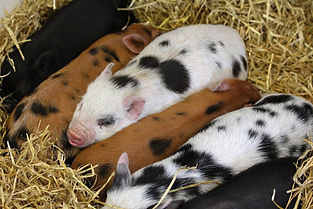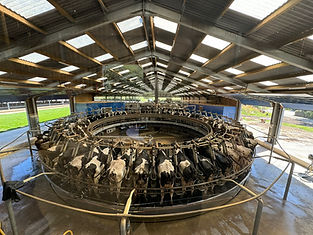Our 2025 Studentships
Application Deadline - apply by Friday 17th January at 12pm (GMT).
We are delighted to announce our fully-funded, four-year PhD studentships in the application of Artificial Intelligence to sustainable agri-food, to start in October 2025.
Explore the projects in more detail below. Apply via our Application page.

Home Applicants Only
Leveraging Airborne and Ground-Based Drones, Canopy Modelling, Digital Twin Technology, and AI Robotics for Climate-Adaptive Vineyard Management in UK Viticulture.
Dr David Green, University of Aberdeen; Dr Riccardo Polvara, University of Lincoln; Ian Beecher Jones, JoJo's Vineyard.
This project focuses on integrating drones, canopy modelling, digital twinning, and AI robotics to optimise UK vineyard management amid climate change. It involves lab and fieldwork, data collection, AI-driven modelling, and climate simulations. Training includes remote sensing, GIS, AI and practical skills, preparing students for advanced viticulture research and management.
Read More

Harnessing AI Tools and DNA-based Monitoring to Enhance Arthropod Biodiversity Assessments
Dr Karen Siu Ting, Queen's University Belfast; Prof Christos Tachtatzis, University of Strathclyde; Dr Neil Warnock, Dr Florentine Spaans and Dr Michael Stevenson, Agri-Food and Biosciences Institute (AFBI).
Arthropods are vital for forest ecosystems, but their populations are being threatened by habitat disturbances, climate change and invasive species. This project uses AI and DNA metabarcoding to improve biodiversity assessments in Northern Ireland's commercial forests. The student will analyse samples, develop identification tools, and receive training in AI, molecular techniques, and data management, preparing for careers in data science and ecology.
Read More

Multi-Object Visual Tracking (MOT) of Animals in Agriculture
Dr Niall McLaughlin, Queen’s University Belfast; Dr Christos Tachtatzis, University of Strathclyde; plus an Industry Supervisor.
This project aims to improve the performance of artificial intelligence-based video analytics in agriculture by developing and applying novel methods for Multi-Object Visual Tracking (MOT). Computer vision, video analytics, and AI can help monitor and improve animal welfare while improving farm productivity.
Read More

Home Applicants Only
Clear and sound: combining image analysis and bioacoustics to link pollinators traffic with fruit set and harvest
Dr Fabio Manfredini, University of Aberdeen; Dr James Windmill, University of Strathclyde; Prof Georgios Leontidis, University of Aberdeen; Casey Woodward, AgriSound Ltd.
Insect pollinators, especially bees, are crucial for ecosystem services and crop pollination. This project uses camera and acoustic monitoring to study pollinator-flower interactions and colony activity. Data will be analysed with machine learning to understand how colony traffic affects flower visitation rates and how these two measures impact on fruit set and harvest, providing interdisciplinary training in ecology, bioacoustics, and data analysis.
Read More

Home Applicants Only
Quantitative Verification of Supply Chain Models in the Agri-Food Efficiency Systems: Ensuring Efficiency, Fairness, and Sustainability.
Dr Chunyan Mu, University of Aberdeen; Prof Louise Manning, University of Lincoln; Dr Matthew Smith, Lead Data Scientist for Foods, Marks & Spencer.
This project aims to enhance the agri-food supply chain's sustainability, fairness, and resilience using automated computing techniques. It will model supply chains with game-theoretic and probabilistic approaches, focusing on reducing food waste and ensuring food safety. Practical case studies, like organic farming, will apply these methods. The student will gain expertise in sustainability and risk assessment, preparing them for roles in technology and corporate sustainability.
Read More

Home Applicants Only
Modelling the Impact of Regenerative Land Practices on Carbon Sequestration in Drought Affected Soils Using Machine Learning and Remote Sensing Data
Dr Marta Dondini, University of Aberdeen; Dr Paul Williams, Queen's University Belfast ; Dr. Karpagam Chelliah, S[&T], Rome, Italy
With climate change and constant declines in global soil health, it is imperative that regenerative land management practices are assessed for their capacity to curb trends of land degradation and desertification. This project will assess the ability of a variety of regenerative practices to sequester soil organic carbon (SOC). The regenerative practices selected will be abstracted into their functional properties to be integrated effectively into SOC models. SOC models will be programmatically adapted with machine learning methods, trained at least partially on remote sensing data to model drought affected soils regionally and/or globally. The models developed will be compared with already existing process-based SOC models and ground truth data from collaborating stakeholders to assess accuracy and applicability of the models.
Read More

Home Applicants Only
AI for the Decarbonisation of the Dairy Sector: Heat Recovery and Energy Harvesting
Prof Lina Stankovic, University of Strathclyde; Dr Sean Cullen, Queen's University Belfast; Richard Hey, RHD Scotland Ltd
The project’s aim is to develop AI-driven methodologies to reduce the GHG emissions of dairy farms. The proposed research will design and implement an AI-based energy management system within farms, mitigating waste due to malfunctioning equipment, and enabling waste heat recovery and thermal storage that can be used to heat sheds, water for disinfection of plants etc.
Read More

Data and Knowledge Dual-Driven Artificial Intelligence in Remote Sensing
Dr Anna Jurek-Loughrey, Queen’s University Belfast; Dr Yeran Sun, University of Lincoln; plus an Industry Supervisor
Remote sensing data analysis plays a crucial role in advancing sustainable agriculture, offering valuable insights and aiding informed decision-making. In the intersection of artificial intelligence (AI) and machine learning, remote sensing introduces distinctive challenges.
Read More

Home Applicants Only
A Machine Learning Accelerated Spectral Matching Algorithm to Identify Harmful Algal Blooms and Other Threats to Aquaculture Operations.
Dr David McKee, University of Strathclyde; Prof Paulo A. Prodöhl, Queen's University Belfast; Dr Claire Neil, Scottish Environmental Protection Agency
This project aims to revolutionise water quality monitoring in aquaculture environments by combining optical oceanography and genomics. By integrating remote sensing data with genetic material analysis, it will enhance early warning systems for harmful algal blooms (HABs) and other threats like microjellyfish. This approach will allow for more precise detection and prediction of HAB events, which is crucial for effective aquaculture management.
Read More

Flavour-centric Innovation for Cultivated Meat: Bridging the Sensory Gap in Cellular Agriculture
Dr Tassos Koidis, Queen's University Belfast; Prof Georgios Leontidis, University of Aberdeen; Multus Biotechnology
The modern practices of industrial farming have faced scrutiny due to their adverse effects on health and the environment. As the global population rapidly increases, the quest for sustainable and nutritious alternatives to traditional animal products becomes crucial.
Read More

Combining Hazard Prediction and Animal and Plant Health Diagnostics for Enhanced One-Health Decision Support Under Climate Change
Prof Eric Morgan, Queen's University Belfast; Prof Adam Kleczkowski, University of Strathclyde; Paul Wagstaff, Self-Help Africa; Rob Strey, PEAT GmbH / Plantix
This project aims to enhance existing systems for monitoring small ruminant health on smallholder farms in Africa by integrating real-time health information with predictive models of parasite transmissions, providing actionable advice on antiparasitic interventions. The project will apply ML to identify the most informative health indicators and the most efficient monitoring strategies. Climate-driven predictions of parasite transmission potential will be incorporated, allowing monitoring and actions to be calibrated to epidemiological risks. The key output will be a smartphone app, providing this capability to farmers and advisors. Additionally, the project will explore aligning the app with comparable risk prediction tools for plant health, helping farmers and others to identify and mitigate multiple threats to food security through simultaneous impacts on crops and animals.
Read More
Assigned Projects

Dr Roslyn Henry, University of Aberdeen; Prof Georgios Leontidis, University of Aberdeen; Dr Mamatha Thota, University of Lincoln; Prof Jonathan Hillier & Dr Milad Toolabi, Trinity AgTech
This project aims to develop precise tools for monitoring biodiversity, enhancing sustainability and conservation efforts in agricultural landscapes. The objectives are to 1) develop deep learning methods for high-resolution landscape mapping using Earth Observation data; 2) implement biodiversity models using deep learning to monitor biodiversity changes on farms over time and 3) integrate high-resolution landscape and biodiversity maps into Trinity AgTech's natural capital navigator, 'Sandy'. Read more.

Dr Arran Hodgkinson, Queen's University Belfast; Prof Ilias Kyriazakis, Queen’s University Belfast; Dr Mingjun Zhong, University of Aberdeen; Agri-Food and Biosciences Institute
Machine learning (ML) is an invaluable modern technique whose insights, leveraged against large-scale databases tracking agricultural practices and outcomes, could radically change farming practices, both to the benefit of livestock and farmers, alike. Read more.

Dr Linda Oyama, Queen's University Belfast; Dr Mingjun Zhong,University of Aberdeen; Dr Sadie Douglas, AB Neo
This project will utilise AI, including Bayesian models, to integrate and analyse data from controlled trials, manaement practices and microbiome sequencing. The goal is to better understand the interplay between dietary interventions, the gut microbiome, piglet weaning diarrhoea (PWD) and antimicrobial resistance (AMR). It aims to develop AI-driven strategies to enhance piglet health and mitigate AMR, collaborating with agri-food practitioners to co-create solutions that improve piglet welfare and farm productivity. Read more.

Prof Georgios Leontidis & Dr Aiden Durrant, University of Aberdeen; Dr Oorbessy Gaju, University of Lincoln; Dr Iain Place, Waterside Pharmaceuticals
The project aims to develop a crop-physiology-informed multimodal machine learning system to automate plant growth forecasting and health monitoring of medicinal cannabis production in controlled environment agriculture systems. Read more.


Prof Chris Creevey, Queen's University Belfast; Dr Robert Atkinson, University of Strathclyde
The overarching aim of this project is to apply explainable AI to extensive ruminant-associated microbiome data, in order to understand the ecological drivers of stable-state microbial communities linked to low emissions from the host. Read more.

Prof Craig Michie, University of Strathclyde; Prof Chris Creevey, Queen’s University Belfast; Dr Mazdak Salavati, SRUC
The project focuses on using artificial intelligence (AI) in the dairy sector to identify novel traits with strongest degrees of biological connection to Green House Gas (GHG) emissions from animals. Most dairy farms in the UK and around the world sample the milk on a regular basis for fat, protein, and spectral measurements. Read more.

Dr Vladimir Stankovic, University of Strathclyde; Dr Marta Dondini, University of Aberdeen; Dr Lina Stankovic, University of Strathclyde; RHD (Scotland) Ltd
The agri-sector, especially dairy farming, is a major contributor to greenhouse gas (GHG) emissions with 18% of annual worldwide GHG emissions attributed to animal farming. Understanding the variation in GHG emissions among different farming practices helps to identify sustainable approaches that reduce pollution. Read more.

Dr Robert Atkinson, University of Strathclyde; Dr Lan Qie, University of Lincoln; Prof Christos Tachtatzis, University of Strathclyde; Lactalis
Satellite Earth Observation (EO) Data has emerged as a game-changer in accurately assessing plant biodiversity and ecosystem functions within agricultural landscapes, spanning both grassland and arable terrains. Read more.
